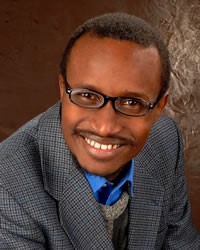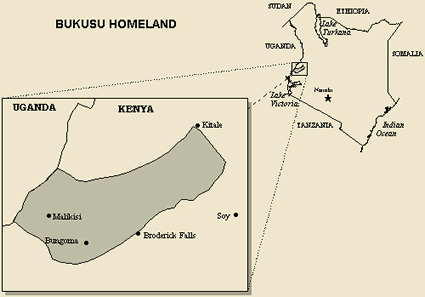The Bukusu are a Bantu people who are part of the larger Luhya ethnic group.
Traditionally, there has been resistance to modern influences among the Bukusu. This was most vividly expressed in the Dini ya Msambwa movement, led by Elijah Masinde. Despite Masinde's death several years ago, the movement still commands some following. This movement is a blend of traditional religious elements and Christian influences. It manifested itself clearly as a protesting movement against colonial authorities. Its leader was detained several times, mainly in relation to the attacks carried out on administrative institutions. A ban was reinstated even after independence, due to an anti-establishment attitude in both word and deed.
Most Bukusu Luhyas live in Kenya, but there is also a significant number in neighboring Uganda.
Their primary source of income is from subsistence farming, but cattle and other domestic animals also play a significant role in their economy and food source. Sugar cane and coffee are two of their most important agricultural crops. The area usually receives sufficient rain to sustain the population.
As for religion, sacrifice was the basic ritual for the movement, just as for the traditional religion. Ancestor worship also played an important role.
The Bukusa Luhyas are officially Christian with over half being Evangelical. They need to focus on the finished work of Christ and making his name known.
As is the case in most Kenyan communities, the traditional culture is under heavy pressure. Development and modernization have a substantial impact on most parts of traditional life. However, they have maintained a large number of traditional customs, some of which have been adapted to modernity. For instance, initiation rites still take place among virtually all sections of the population. Still, the timing has been adapted to coincide with school vacations, so that they do not interfere with the child's education.
Pray for the Holy Spirit to move powerfully in Bukusu Luhya churches and families.
Pray for them to draw close to the only Savior, Jesus Christ, and desire an even closer walk with him.
Pray for hundreds to be called and sent by their churches to the spiritually lost in Sudan and Somalia.
Pray for the Lord to bless them with a record-breaking harvest this year as a testimony of his love and power.
Scripture Prayers for the Luhya, Bukusu in Kenya.
| Profile Source: Joshua Project |











